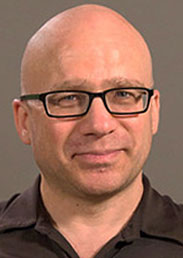What is the difference between antisemitism and anti-Israelism?

Elliot Ratzman, postdoctoral fellow of Jewish studies in Lawrence University’s religious studies department, will help clarify how we can identify and distinguish between the two in the second installment of Lawrence’s 2017-18 cultural competency series.
Ratzman presents “Antisemitism and Intersectionality: Understanding the Subtleties of Anti-Jewish Oppression and Jewish Privilege” Wednesday, Oct. 18 at 11:30 a.m. in the Esch Hurvis Room of the Warch Campus Center. The event is free and open to the public.
While Jews are an admired, powerful, successful and mostly white subgroup within the United States, antisemitism persists. Targeted by the “alt-right,” Jews are seen as racially other and subject to periodic violence.
Outrage on the left of the political spectrum over the state of Israel’s treatment of Palestinians has led to robust boycott campaigns and made the Palestinian cause highly visible on college campuses and in protest movements regarding racism and policing.
In his presentation, Ratzman will examine the question of when does Israel-critique become antisemitism and argue for the importance of attending to antisemitism for intersectional analysis and activism.
Ratzman joined the Lawrence faculty this fall as part of the university’s post-doctoral fellow program. His scholarship interests include modern Jews and Judaism, religious ethics, secularism/atheism, race and religion. He earned a bachelor’s degree from Ohio University, a master’s degree from Harvard Divinity School and a Ph.D. from Princeton University.
About Lawrence University
Founded in 1847, Lawrence University uniquely integrates a college of liberal arts and sciences with a nationally recognized conservatory of music, both devoted exclusively to undergraduate education. It was selected for inclusion in the book “Colleges That Change Lives: 40 Schools That Will Change the Way You Think About College.” Engaged learning, the development of multiple interests and community outreach are central to the Lawrence experience. Lawrence draws its 1,500 students from nearly every state and more than 50 countries.